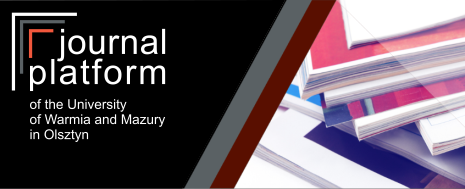ETHICAL STANDARDS
The ethical policy of Civitas et Lex follows the Committee on Publication Ethics (COPE) recommendations (http://publicationethics.org/).
1. Ethical Responsibilities of Authors:
- The authors guarantees that their manuscript is original, does not infringe the copyright of anyone, and it has neither been previously published nor is currently under consideration for publication elsewhere. The text should disclose sources of data and information that will allow the research to be replicated.
- The text should be the authors’ intellectual property. Manuscripts must be free from any form of plagiarism, which is considered to be highly unethical and unprofessional and is likely to bring the authors and the publisher into disrepute. Kindly note that if suspicion is raised about the originality of the manuscript (unattributed to source), the Editorial Board may check the manuscript for plagiarism. Manuscripts will be rejected by the Editorial Board if they contain any form of plagiarism – intentional and/or unintentional plagiarism. Self-plagiarism is also unacceptable.
- Manuscripts must display all credits due; acknowledgement of the work (ideas, concepts, words, among others) of third parties must be properly displayed.
- Should the need arise, authors must be ready to provide both the Civitas et Lex Editorial Board and the Reviewers with the raw data and procedures used in their manuscript. Inaccurate or fraudulent data or procedures violate the ethical standards of Civitas et Lex and disqualify the manuscript for consideration for publication.
- Conflicts of interest are relationships that entail professional subordination and economic dependence as well as social relations, which can affect impartial assessment of the merits of manuscripts. The editors require the authors to make a statement on the lack of conflict of interest and provide information that will help to prevent such conflict (see: AUTHOR DECLARATION).
- The authors have the responsibility to make sure that all parties who contributed to the submitted manuscript are properly displayed inside the manuscript either as co-authors or as contributors. Also, it is the duty of the authors to ensure that all co-authors are aware of the final version of the manuscript and that there was a full consensus of all the authors with regard to its submission to Civitas et Lex. The authors should also provide the editorial board with information about the sources of financing of the publication, contribution of academic research institutions, associations and other entities.
Detailed information for Authors see – PDF
2. Ethical Responsibilities of Reviewers:
- Manuscripts will always be evaluated in terms of their intellectual merit and contribution to the aims and scope of Civitas et Lex. Thus the reviewers should adhere to standards of fairness, integrity, and objectivity. Kindly note that personal criticism is unacceptable
- Reviewers who feel that their review comments might be biased and/or unqualified regarding a particular manuscript submitted for publication to Civitas et Lex should notify the Editorial Board immediately and excuse themselves from the review process.
- Reviewers should be clear in their review comments and provide proper explanations and arguments for their decisions. If suspicion is raised about the originality of the manuscript (unattributed to source), reviewers are expected to notify the Editorial Board immediately, with the appropriate justification.
- During the review process, reviewers will keep in mind that the manuscript and related materials are confidential.
- Reviewers warrant that they will not use the manuscripts and related materials submitted for publication in Civitas et Lex for any other purpose other than the peer review process, without the Editorial Board’s and/or author’s permission.
- Reviewers are required to meet a set review deadline. The reviewer should immediately inform the editorial board of the reasons for delays or of withdrawal from reviewing the text.
Detailed information for peer reviewers see – PDF
3. Ethical Responsibilities of the Civitas et Lex Editorial Board :
- The editorial board decides which papers will be published, takes care to ensure the quality of published material and, if necessary, is ready to publish a revision, erratum or correction, if needed. The editorial board accepts responsibility for all the content featured in the journal.
- Manuscripts will always be evaluated only based on their intellectual merit and contribution to the aims and scope of Civitas et Lex. Therefore the Editorial Board adheres to standards of fairness, integrity, and objectivity.
- The Editorial Board ensures the confidentiality of the manuscript and related materials submitted by the authors to Civitas et Lex.
- The manuscript and related materials will only be disclosed to the authors, reviewers, and the publisher.
- The Editorial Board ensures that unpublished materials contained in a submitted manuscript will not be used by the members of the Editorial Board who had access to the manuscript during the review/publication process for any other purpose other than the Editorial process without the consent of the author(s).
- The editorial office uses the UWM Journal Platform system (https://czasopisma.uwm.edu.pl/index.php/cel), which permits a comprehensive, electronically-based editorial process, under which the editor, reviewer and author of the text may conduct a discussion and make corrections at each stage of the publication process.
- Members of the editorial board are obliged to take care to ensure scientific integrity of the published works. If dishonest practices are suspected, the editors are obliged to withdraw the text from publication and to take steps to explain and remedy the situation. The detected cases of ethics violation (plagiarism, falsification of research results, manipulation of research results, inventing research results, etc.) should be reported by writing to the journal’s Editor-in-Chief (e-mail: wojciech.guzewicz@uwm.edu.pl). A violation can be submitted by a member of the editorial board, reviewer, journal reader or any other person who holds suspicions as to the integrity of the text. The editorial board acts in compliance with the principles formulated by the Committee on Publication Ethics (COPE) https://publicationethics.org. When ethical principles are violated in a paper already published the editors will remove the paper from the website, providing information about the reasons for the withdrawal and, in the case of a text published in print, the editors will publish an appropriate statement in the next edition of the journal. The editorial board will notify the author, the institution he/she is affiliated with, reviewers, the aggrieved parties and also, if necessary, other ethics supervisory bodies. If ethics violations in the text are minor, it will be possible to republish the corrected text. If there is a conflict of interest within the editorial board, the report should be submitted to the Publisher (wydawca@uwm.edu.pl).
In order to prevent cases of scientific misconduct, the Editorial Board has procedures in place to deal with cases of “Ghost-writing”, “Guest Authorship”, “Plagiarism” and “Self-plagiarism”.
Ghost-writing: A situation where someone makes a substantial contribution to a publication without revealing his or her participation as one of the authors or without being mentioned in the acknowledgments attached to the publication.
Guest Authorship or Honorary Authorship: A situation where one or more authors are cited as making a significant contribution to a work wereas in reality the contribution is insignificant.
Plagiarism: The act of using someone else’s work as one’s own without acknowledging the source of that work.
Self-plagiarism: The act of using your own earlier published work without acknowledging the source of that work.
All detected cases of plagiarism, ghostwriting and guest authorship will be disclosed, which also applies to notification of relevant institutions.


